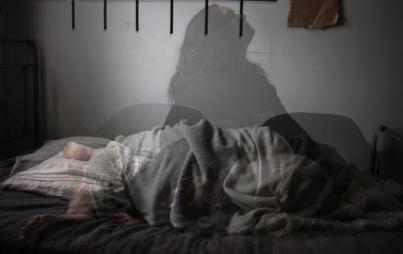
"You cool with this? Yes? Awesome." (Credit: ThinkStock)
I’m going to get real real on this, real quick. Though I consider myself a somewhat intelligent, cognitively-abled, educated person, I am straight-up confused as fuck about the intense backlash against California’s affirmative consent law SB 976. To be clear, I’m more than aware of the Men’s Rights Movement and the horrifying, vitriol-inducing insecurities of many, many, far-too-many Internet commenters. I'm also aware of general misunderstandings surrounding consent, as well as rape illiteracy. But still, the number of well-established media types coming down against this law? File me under "flabbergasted."
SB 976 Recap And Clarity
The backstory is thus: On, September 28, California governor Jerry Brown signed SB 976 into law. California’s state senate had unanimously approved the bill’s legislation, which requires all colleges receiving student financial aid funding from the state to agree that, in campus investigations of sexual assaults, silence, drunkenness, unconsciousness or lack of resistance do not constitute consent. Instead, "an affirmative, unambiguous and conscious decision" by each party to engage in sexual activity is required.
And, for those who oppose this move by the Golden State, the horror is spreading to New York, where governor Andrew Cuomo announced that the 64 campuses of the State University of New York will now mandate “yes means yes” polices in the same way California does.
Before we jump in, let’s make a few things crystal clear:
First up, California’s new law does not affect criminal law whatsoever; it only applies to colleges’ disciplinary policies. Full. Stop.
Secondly, contrary to the irrational cries of fascism out there, verbal consent, that is, saying yes to every sexual act that transpires, is not what this non-criminal law mandates. It only states that:
"It is the responsibility of each person involved in the sexual activity to ensure that he or she has the affirmative consent of the other or others to engage in the sexual activity. Lack of protest or resistance does not mean consent, nor does silence mean consent."
Third, the SB 976 in no way stipulates what colleges have to do were someone found guilty of sexual assault. Federal law only mandates that the student be punished in some way. But it's still up to the school's discretion on how to do that.
Finally, a reminder: False rape accusations? A much rarer phenomenon than perceived. Studies have shown that only 2-8% of people file them. Because let's also keep in mind, in this little conversation, the kinds of incentives that exist for making them: very few. One must look only to how mainstream media was visibly shaken about the Steubenville rapists’ would-be bright futures and the way much of the town rallied around shaming and blaming the victim to understand that the term “rape survivor” isn't so much a coveted one. There's even one, Emma Sulkowicz, at Columbia who was driven to hauling around dorm furniture to every class to make a statement about how deeply unjust it was to make her draw a diagram about anal sex for her college's university disciplinary board—while her accused-rapist still remains on campus.
The Freakouts
And yet. People are freaking the fuck out.
NY Magazine’s Jonathan Chait terms the law “radical” in his, by our estimation, radically titled piece: “California’s Radical College-Sex-Law Experiment.” In it, he claims that the new law will legally redefine “most, and possibly nearly all, sexual encounters” as rape.
Seriously? Yeah, he’s serious. He goes on to describe his “deep reservations” about “deprogramming and reorienting societal ideas about sex” by “codifying them into law.”
Is it that “radical” for colleges—and, we'll reiterate, only college disciplinary boards—to hold that people be sober and consenting to sexual experiences? Especially in a climate where one in five women faces sexual assault during their time in college—with only 13% of women reporting said crimes? Is it really that hard to tell if a person is into boning—or, if you’re not sure, does it put a person out that much for he or she to ask to make sure!?
Perhaps more upsetting than Chait’s appraisal is that of Batya Ungar-Sargon, whose New Republic piece, “‘Affirmative Consent’ Is Bad for Women,” echoes Chait’s sentiments that holy-shit-everyone-in-California-will-now-be-a-sexual-assailant:
"Much of what we call courtship—and the pleasures therein—revolves around sending, reading, interpreting, and changing these signals. Surely a misunderstanding should be judged under the law differently than an outright desire to harm. Surely we are all guilty of trying to convince people to have sex with us. Are we rapists? Surely, we have all enjoyed a little drunken cavorting. According to Bill 967, if we did this while college students in California, we are sexual assailants. The fact that no one accused us of rape does not mitigate the bill’s claim that sexual assault was perpetrated."
I get that we've entered the Clickbait Era, but isn't the URL "californias-campus-consent-laws-every-sex-act-potential-crime" a bit much for a law that only deals with colleges?
But more disturbing, in fact, much, much more disturbing than even this take is that of Shikha Dalmia, whose article “California’s Sexual Consent Law Will Ruin Good Sex for Women” (with its corresponding URL "ruining-sex-in-california") actually, literally, verbatim, like word-for-word, says this:
"The truth is that, except in the first flush of infatuation, both partners are rarely equally excited. At any given moment, one person wants sex more passionately than the other. What's more, whether due to nurture or nature, there is usually a difference in tempo between men and women, with women generally requiring more 'convincing.' And someone who requires convincing is not yet in a position to offer 'affirmative' much less 'enthusiastic' consent. That doesn't mean that the final experience is unsatisfying—but it does mean that initially one has to be coaxed out of one's comfort zone. Affirmative consent would criminalize that.
The reality is that much of sex is not consensual—but it is also not non-consensual. It resides in a gray area in between, where sexual experimentation and discovery happen. Sex is inherently dangerous. Sometimes, there will be misadventures when these experiments go wrong. Looking back, it can be hard to assign blame by ascertaining whether both partners genuinely consented. But trying to shoehorn sex into a strict, yes-and-no consent framework in an attempt to make it risk free can't help but destroy it."
So . . . making sure your partner wants to do coitus with you absolutely obliterates the act?
Once again, I have to bemoan our culture’s fraught relationship with sex—and then add a lot more bemoaning.
Especially in a climate where a Texas fraternity recently touted signs saying “No means yes, yes means anal,” if making sure the person you’re getting frisky with wants said friskiness is the thing ruining the act—we need a lot more than SB 976 to save us.






